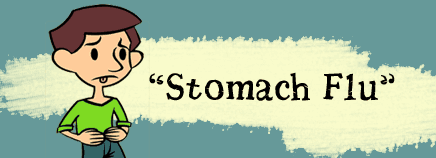|
|
Recently my daughter came down with her very first stomach flu. Thankfully she has gotten better and returned to school but unfortunately not before passing it on to her little brother. Needless to say, it has been a rough two weeks. As with any new thing, I took this as a learning opportunity to research as much as I can about the stomach flu. Through a doctor, a nurse from Telehealth, a poison-control expert, and internet research, this is what I have learned.
What causes the stomach flu?
A variety of viruses, the most common being the rotavirus in the winter months, can bring on symptoms of nausea, upset stomach, vomiting, and diarrhea. Although uncomfortable, the stomach flu is usually not a serious illness in children, and will usually clear up on its own.
What are the symptoms?
- Stomach ache
- Decreased appetite
- Vomiting
- Diarrhea
- Fever
Your child may have a couple or all of the symptoms. The more symptoms your child has, the more severe the illness usually is and the longer it will take to get better.
What constitutes as diarrhea?
Diarrhea is the sudden passage of an increased number of stools that are either very soft or watery. If your child has diarrhea it is very important to replenish all the fluid that is being lost in order to prevent dehydration.
How can you tell if your child has the stomach flu or food poisoning?
The symptoms of both the stomach flu and food poisoning are similar. Usually the symptoms of food poisoning occur right away and resolve sooner than that of a stomach flu. With food poisoning, your child may have eaten something out of the ordinary or something that has gone bad like food or milk left out for too long.
How long can it last?
Stomach bugs typically last 3-7 days. It can take up to another week for your child’s appetite to return to normal.
Is it contagious?
- Yes, stomach bugs spread fast through fecal matter mostly, but also through saliva. Here are some ways to help prevent others from getting sick:
- Wash your hands often, especially before meals and after changing diapers and using the toilet
- Use hand sanitizer when soap and water is not available
- Do not allow your children to drink from the same cup or eat from the same plate
- Clean toys accordingly, especially when you have children that put toys in their mouths
- Do not send your sick child to daycare or school until they have been symptom-free for at least 24 hours (children can remain contagious for up to 72 hours after they have started to feel better)
How can the stomach bug be treated?
There is no way to treat the stomach flu, but it is possible to manage symptoms by making changes to your child’s diet.
What foods should my child eat?
If your child has severe diarrhea or vomiting, chances are that he or she also has an upset stomach and no appetite. Do not force your child to eat if he or she has no appetite. If you notice that your child’s appetite is returning you can try giving the following foods:
- Banana
- Plain rice
- Applesauce
- Toast
- Saltine crackers
- Dry cereal
- Pretzels
- Mashed potatoes (without butter and milk)
- Hard-boiled egg
Try each item one at a time and watch how your child’s body reacts.
What foods should my child avoid?
The following foods may make diarrhea worse:
- Milk
- Yogurt
- Cheese
- Fruit juices (including apple juice)
- Carbonated drinks
- Tea (Tea is a diuretic and can increase urination and therefore more loss of water occurs)
If you need to give your child juice, water down the juice. Concentrated juices make diarrhea worse.
How do I keep my child hydrated?
- Give your child clear fluids such as water, watered down juices, and broth. If your child has severe diarrhea avoid concentrated fruit juices and milk. Avoid carbonated beverages such as ginger ale and beverages with caffeine. Caffeine increases urination and therefore can speed up loss of water, especially if your child is vomiting or has diarrhea.
- Fluids should be given in frequent small sips rather than large amounts. Giving a lot at once can trigger vomiting and diarrhea.
- Pay attention to how often and how much your child is urinating.
- If your child is refusing water or fluids, try giving an electrolyte solution such as Pedialyte. Otherwise, Pedialyte is not necessary.
What are the signs of dehydration?
- Decreased urination (If your child is in diapers, keep track of the number of wet diapers)
- Decreased saliva (inside of the mouth is not moist)
- No production of tears when crying
When should I take my child to see a doctor?
- You should take your child to see the doctor if:
- Your child has a fever for more than 3 days
- You notice signs of dehydration
- There is blood, pus, or mucous in your child’s stools
- The diarrhea becomes very severe (8 stools in less than 8 hours)
- Your child seems lethargic
- Vomiting lasts more than two days and is accompanied by diarrhea
What medicines can I give my child?
- If your child has a fever or pain, use acetaminophen (Tylenol) according to the instructions
- Do NOT use Advil, Motrin or any other products with Ibuprofen as it tends to irritate the stomach
- Do NOT use Pepto Bismol or any similar bismuth products
Things to keep in mind
- It is best to wash your child after each loose stool, to prevent irritations and rashes, especially if your child is still in diapers
- If your child is in diapers use a thick layer to Vaseline to protect and sooth the skin
- Change your child’s diaper often and right away after each bowel movement
- Once your child starts feeling better, give your child a probiotic yogurt. (Probiotic yogurts contain a healthy bacteria that can help replace the unhealthy bacteria in the gastrointestinal tract)
- Getting the flu shot, does not offer protection against the stomach flu
- Babies (one and under) should be taken to see a doctor if fever persists for more than two days or if diarrhea occurs for more than 24 hours. The risk of dehydration for children under one is much higher.
Remember when it comes the stomach flu, the best thing to do is keep hydrated and let the flu run its course.




Great informative post
Thank you!